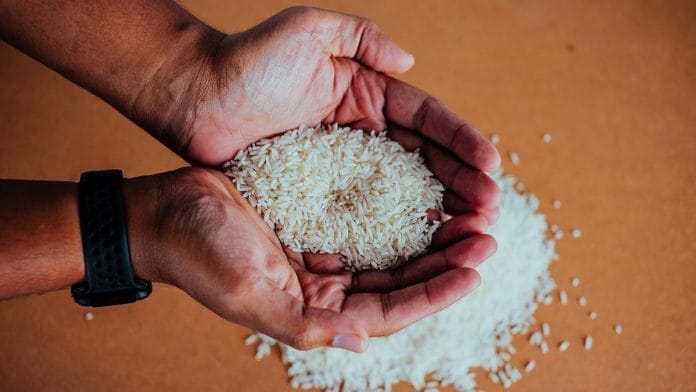New Delhi: The Narendra Modi government has introduced a computer-operated and portable device called AnnadarpanSMART in seven states for quality analysis of rice varieties. The device, officials hope, will put an end to alleged exploitation of farmers at the hands of corrupt officials, rice millers and middlemen during manual evaluation methods.
The product, developed by the Centre for Development of Advanced Computing (C-DAC) in collaboration with other government agencies in 2018, can perform appearance-based quality analysis of crops on national/Food Corporation of India (FCI) quality standards.
Sources at the Ministry of Consumer Affairs, Food and Public Distribution (MCAFPD) have told ThePrint that 30 FCI storage centres have been integrated with the system so far for quality determination and procurement of rice. Punjab has 13 such systems while Haryana has five, four each in Andhra Pradesh and Uttar Pradesh, one in West Bengal, two in Odisha, and one in Chhattisgarh.
Nabarun Bhattacharya, director of C-DAC, told ThePrint that the estimated cost of each AnnadarpanSMART device is Rs 2 lakh and it has a development period of three years.
“As of now, the system is only being used to evaluate non-aromatic (non-basmati) rice varieties to ensure quality procurement of rice meant for public distribution system. The device uses image-processing technology under controlled illumination for evaluation of rice,” he added.
Also read: This ‘seed warrior’ is collecting & preserving India’s rare, indigenous rice species
Current method ‘promoted corruption’ at local level
Until now, evaluation of rice varieties at FCI storage centres was done manually and prices fixed accordingly. But questions have often been raised on the authenticity of such analysis and integrity of local FCI officials, middlemen and rice millers while determining prices.
An official at MCAFPD’s quality control department told ThePrint, “Human-based arbitrary method for quality determination of rice practised till now promoted corruption through rice millers, middlemen and local level FCI officials while exploiting farmers by assigning unfair rates to their produce.”
He also said the product was yet to be introduced in several other states due to protests by rice millers associations.
The official further explained that AnnadarpanSMART will scientifically determine the quality of rice varieties during procurement, storage and distribution through FCI outlets. It will evaluate rice qualities on nine parameters — such as grains by weight, broken rice, admixture, de-husked, chalky grains, red grains, damaged/discoloured grains and humidity content – in order to generate a computerised test result.
‘Millers are also exploited by officials’
Refuting the government’s allegations of protests by rice millers, associations said that the authorities had failed to take their views into consideration while introducing the device.
Tarsem Lal Saini, president of the Punjab Rice Millers Association, told ThePrint, “This is an arbitrary implementation of computer-based evaluation system by the government. We had been asking authorities to let us inspect the system for the past three-four years. But they refused to.”
While putting the onus of farmer exploitation on state agricultural officers and FCI officials, Saini added, “Millers are also exploited by government servants for fixing prices and determining the quality according to them.”
India has been the world’s largest rice exporter since 2011-12 after it replaced Thailand from the leading position. The country’s share in world exports in the past four years has stayed at 25 per cent. Some of the major export destinations for Indian non-basmati rice during 2018-19 are Nepal, Benin, Senegal, Bangladesh and Guinea.
During 2018-19, India exported 75,99,552.15 MT of non-basmati rice varieties for Rs 21,184.85 crore. The government had earlier lifted a four-year ban on export of non-basmati varieties in February 2011.
Also read: India is the largest exporter of water, even as taps run dry across the country







Yes, The Print is absolutely. FCI officials are corrupt. Rest all the stake holders I.e. Farmer, Mandi Parishad, those State Agencies,/cooperative societies/private players purchasing more than 97% stock, Kisan Unions, katcha Arthias in mandi, labour, handling and transport contractors, inspecting officers of Food Ministry, FSSAI, PDS nominees lifting stock from FCI, journalists and media like you writing such superficial story are damn honest people and only FCI officials are corrupt.
A layman can easily understand that if it was such a simple exercise, why officials are being posted on ground. Why not then govt deploy such machines which can easily check the quality and purchases of the stock in Mandi, in godowns can be easily made with robots which are not corrupt .
Are Bhai, agar sab officials corrupt hi hain to fir wahi log to ye machines b operate krenge Na. Ya sample b ye machine hi nikal Legi. Kuch b likh k chhaap dene se pahle ye to pta kr lia kro ki foodgrain procurement ka kam step by step kaise hota hai. Bina jane bujhe likhoge kuch b to print media pr bna hua bacha khucha bharosa b uth jaega.